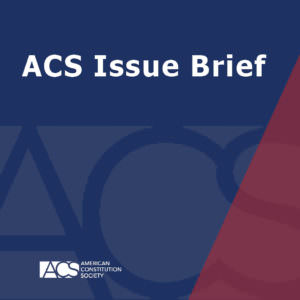Title IX and the New Spending Clause
General Counsel and Vice President for Education and Workplace Justice, National Women's Law Center
December 4, 2012
 ACS is pleased to distribute "Title IX and the New Spending Clause," an Issue Brief by Emily J. Martin, Vice President and General Counsel at the National Women's Law Center.
ACS is pleased to distribute "Title IX and the New Spending Clause," an Issue Brief by Emily J. Martin, Vice President and General Counsel at the National Women's Law Center.
In June, the Supreme Court held that the Affordable Care Act exceeded Congress's Spending Clause powers because it conditioned states' continued receipt of Medicaid funding on the states expanding Medicaid coverage to poor adults. Since this decision, many have wondered whether significant civil rights statutes, also enacted under Congress's Spending Power, could similarly be found unconstitutional. One potentially impacted statute, Title IX of the Education Amendments of 1972, prohibits entities receiving federal funding from discriminating on the basis of sex in education programs or activities. "Title IX has had a revolutionary effect in opening educational opportunities to women and girls over the past forty years," Martin writes.
This Issue Brief analyzes the structure and function of Title IX and sets out the key legal distinctions between Title IX and the ACA's Medicaid expansion, providing a roadmap for litigators who inevitably will confront challenges to Title IX's constitutionality by defendants facing Title IX claims. "[A] fair analysis of the holding demonstrates that because Title IX is markedly different from the challenged Medicaid expansion in key ways, Title IX is constitutional, even under the Court’s re-envisioning of Spending Power jurisprudence," Martin asserts. The Issue Brief also explains that even if a court were somehow to conclude that Title IX exceeded Congress's Spending Power, the law remains an appropriate exercise of Congress’s authority to enforce the Equal Protection Clause under Section 5 of the Fourteenth Amendment.
While the Court's decision on the Affordable Care Act may encourage litigation challenging antidiscrimination laws, "[t]he fundamental principle that the federal government can ensure that its funds are not spent in support of invidious discrimination remains robust." As a result, Title IX "remains strong," Martin concludes in her Issue Brief.
Read the full Issue Brief here: Title IX and the New Spending Clause
